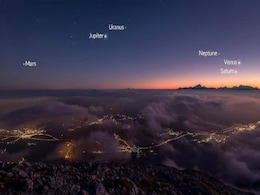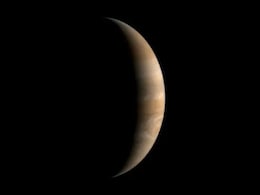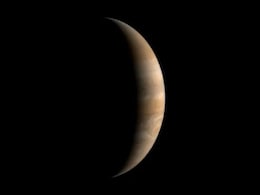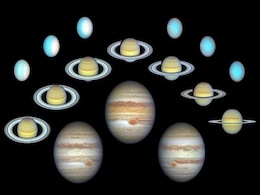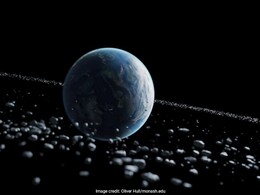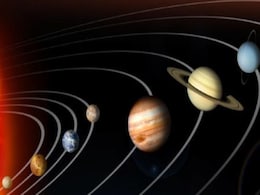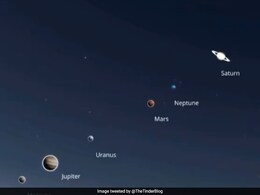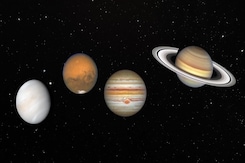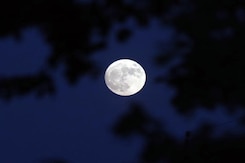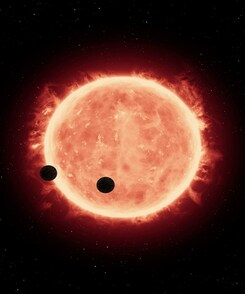Planet Saturn
- All
- News
- Videos
- Web Stories
-

NASA's Webb Captures First Direct Images Of Carbon Dioxide Outside Solar System
- Tuesday March 18, 2025
- Science | Edited by Ritu Singh
This finding provides compelling evidence that the giant planets in HR 8799 formed through core accretion, a process similar to the formation of Jupiter and Saturn.
-
 www.ndtv.com
www.ndtv.com
-

Rare Seven-Planet Alignment 2025: How to Watch in India, Best Viewing Tips
- Monday February 24, 2025
- Written by Gadgets 360 Staff
A rare celestial event featuring seven planets—Mercury, Venus, Mars, Jupiter, Saturn, Uranus, and Neptune—aligning along the ecliptic will be visible in 2025. The alignment starts on February 28, with the best viewing in India on March 3. Venus and Jupiter will be easily visible, while Uranus and Neptune will require a telescope. Experts sugges...
-
 www.gadgets360.com
www.gadgets360.com
-

February 2025 Planet Parade: How to See Five Planets Align in the Sky
- Wednesday February 5, 2025
- Written by Gadgets 360 Staff
A rare celestial event will unfold in February 2025, with five bright planets—Venus, Jupiter, Mars, Mercury, and Saturn—visible in the evening sky. The highlight occurs on February 24, when Mercury and Saturn appear closest. Uranus and Neptune can also be observed with telescopes. Best viewing conditions require a clear west-southwest horizon a...
-
 www.gadgets360.com
www.gadgets360.com
-

Mysterious Interstellar Object Might Have Shifted Four Planets’ Paths, Study Finds
- Thursday January 30, 2025
- Written by Gadgets 360 Staff
A mysterious interstellar object, estimated to be eight times the mass of Jupiter, may have significantly altered the orbits of Jupiter, Saturn, Uranus, and Neptune billions of years ago. A study suggests that this body passed remarkably close to the Sun, potentially influencing planetary trajectories. Simulations conducted by researchers indicate ...
-
 www.gadgets360.com
www.gadgets360.com
-

Planetary Parade 2025: How And Where To See This Rare Celestial Event In India
- Saturday January 25, 2025
- Science | Edited by Bhavya Sukheja
Stargazers are in or a treat as six planets - Venus, Mars, Jupiter, Saturn, Neptune, and Uranus - are set to align in the night sky today, January 25, offering a spectacular view.
-
 www.ndtv.com
www.ndtv.com
-

Interstellar Object Could Have Shifted Trajectories of Four Planets, New Research Shows
- Tuesday January 21, 2025
- Written by Gadgets 360 Staff
A recent study suggests that an interstellar object, possibly as massive as eight times Jupiter, may have passed through the solar system billions of years ago, significantly altering the orbits of its outer planets—Jupiter, Saturn, Uranus, and Neptune. Using computer simulations, researchers found that in about 1% of the scenarios, such a close ...
-
 www.gadgets360.com
www.gadgets360.com
-

Ammonium Hydrosulfide Identified as Primary Component of Jupiter’s Clouds, Not Ammonia
- Wednesday January 8, 2025
- Written by Gadgets 360 Staff
Jupiter’s clouds, long believed to be made of ammonia ice, are now confirmed to consist primarily of ammonium hydrosulfide combined with photochemical materials. This groundbreaking discovery, achieved through collaboration between amateur and professional astronomers, has redefined our understanding of the planet's atmosphere. Using innovative m...
-
 www.gadgets360.com
www.gadgets360.com
-

Hubble Telescope Documents 10 Years of Dramatic Changes on Outer Planets
- Friday December 13, 2024
- Written by Gadgets 360 Staff
NASA’s Hubble Telescope has tracked atmospheric and seasonal changes on Jupiter, Saturn, Uranus, and Neptune over ten years. Key findings include shifts in Jupiter’s Great Red Spot, Saturn’s seasonal phenomena, Uranus’ polar brightness, and Neptune’s storm activity. These insights, part of NASA’s Outer Planet Atmospheres Legacy (OPAL) p...
-
 www.gadgets360.com
www.gadgets360.com
-

Earth Had Ring System Similar To Saturn Roughly 466 Million Years Ago: Study
- Tuesday November 19, 2024
- World News | Edited by NDTV News Desk
Like Saturn, Earth may have also had its ring system circling the planet 466 million years ago, according to a study.
-
 www.ndtv.com
www.ndtv.com
-

November Night Sky 2024: Check Out the Brightest Planets and How to Watch Them?
- Monday November 4, 2024
- Written by Gadgets 360 Staff
November's night sky features a spectacular lineup of planets, including Venus, which becomes increasingly prominent in the west. Mars glows brightly as it approaches Earth, while Jupiter rises in the east, captivating observers with its brilliance. Saturn, with its magnificent rings, is also visible high in the southern sky. This month presents id...
-
 www.gadgets360.com
www.gadgets360.com
-

Saturn's Rings To 'Disappear' In 2025. Will They Return? Read About It
- Tuesday September 3, 2024
- Science | Edited by Ritu Singh
This happens because the planet rotates on an axis tilted by 26.7 degrees, and the view of its rings from Earth changes with time.
-
 www.ndtv.com
www.ndtv.com
-

Mark Your Calendar for Aug 24 to Witness a Stunning Planet Parade Featuring 6 Planets in the Sky
- Sunday August 25, 2024
- Gadgets 360 Staff
On August 24, skywatchers will be treated to an impressive planetary parade featuring six planets: Saturn, Neptune, Uranus, Jupiter, Mars, and Mercury. This alignment, occurring in the early morning hours, will provide a unique viewing opportunity. In the US, the best time to catch the spectacle is between 5:45 a.m. ET and sunrise at 6:15 a.m. ET. ...
-
 www.gadgets360.com
www.gadgets360.com
-

The Upcoming "Planet Parade" On June 3 Will Fail To Impress Stargazers. Here's Why
- Thursday May 23, 2024
- Science | Edited by Ritu Singh
While the six planets will align, not all of them will be visible to the naked eye, due to their vast distance from Earth.
-
 www.ndtv.com
www.ndtv.com
-

Meteors, Supermoons, A Comet And More: Your Guide To The Sky In 2024
- Wednesday January 3, 2024
- Science | The Conversation
What exciting events will we see in the southern sky in 2024? Meteor showers, Saturn covered by the Moon, close approaches of bright planets to each other, supermoons and, if were lucky, a comet visible to the naked eye.
-
 www.ndtv.com
www.ndtv.com
-

NASA's Webb Captures First Direct Images Of Carbon Dioxide Outside Solar System
- Tuesday March 18, 2025
- Science | Edited by Ritu Singh
This finding provides compelling evidence that the giant planets in HR 8799 formed through core accretion, a process similar to the formation of Jupiter and Saturn.
-
 www.ndtv.com
www.ndtv.com
-

Rare Seven-Planet Alignment 2025: How to Watch in India, Best Viewing Tips
- Monday February 24, 2025
- Written by Gadgets 360 Staff
A rare celestial event featuring seven planets—Mercury, Venus, Mars, Jupiter, Saturn, Uranus, and Neptune—aligning along the ecliptic will be visible in 2025. The alignment starts on February 28, with the best viewing in India on March 3. Venus and Jupiter will be easily visible, while Uranus and Neptune will require a telescope. Experts sugges...
-
 www.gadgets360.com
www.gadgets360.com
-

February 2025 Planet Parade: How to See Five Planets Align in the Sky
- Wednesday February 5, 2025
- Written by Gadgets 360 Staff
A rare celestial event will unfold in February 2025, with five bright planets—Venus, Jupiter, Mars, Mercury, and Saturn—visible in the evening sky. The highlight occurs on February 24, when Mercury and Saturn appear closest. Uranus and Neptune can also be observed with telescopes. Best viewing conditions require a clear west-southwest horizon a...
-
 www.gadgets360.com
www.gadgets360.com
-

Mysterious Interstellar Object Might Have Shifted Four Planets’ Paths, Study Finds
- Thursday January 30, 2025
- Written by Gadgets 360 Staff
A mysterious interstellar object, estimated to be eight times the mass of Jupiter, may have significantly altered the orbits of Jupiter, Saturn, Uranus, and Neptune billions of years ago. A study suggests that this body passed remarkably close to the Sun, potentially influencing planetary trajectories. Simulations conducted by researchers indicate ...
-
 www.gadgets360.com
www.gadgets360.com
-

Planetary Parade 2025: How And Where To See This Rare Celestial Event In India
- Saturday January 25, 2025
- Science | Edited by Bhavya Sukheja
Stargazers are in or a treat as six planets - Venus, Mars, Jupiter, Saturn, Neptune, and Uranus - are set to align in the night sky today, January 25, offering a spectacular view.
-
 www.ndtv.com
www.ndtv.com
-

Interstellar Object Could Have Shifted Trajectories of Four Planets, New Research Shows
- Tuesday January 21, 2025
- Written by Gadgets 360 Staff
A recent study suggests that an interstellar object, possibly as massive as eight times Jupiter, may have passed through the solar system billions of years ago, significantly altering the orbits of its outer planets—Jupiter, Saturn, Uranus, and Neptune. Using computer simulations, researchers found that in about 1% of the scenarios, such a close ...
-
 www.gadgets360.com
www.gadgets360.com
-

Ammonium Hydrosulfide Identified as Primary Component of Jupiter’s Clouds, Not Ammonia
- Wednesday January 8, 2025
- Written by Gadgets 360 Staff
Jupiter’s clouds, long believed to be made of ammonia ice, are now confirmed to consist primarily of ammonium hydrosulfide combined with photochemical materials. This groundbreaking discovery, achieved through collaboration between amateur and professional astronomers, has redefined our understanding of the planet's atmosphere. Using innovative m...
-
 www.gadgets360.com
www.gadgets360.com
-

Hubble Telescope Documents 10 Years of Dramatic Changes on Outer Planets
- Friday December 13, 2024
- Written by Gadgets 360 Staff
NASA’s Hubble Telescope has tracked atmospheric and seasonal changes on Jupiter, Saturn, Uranus, and Neptune over ten years. Key findings include shifts in Jupiter’s Great Red Spot, Saturn’s seasonal phenomena, Uranus’ polar brightness, and Neptune’s storm activity. These insights, part of NASA’s Outer Planet Atmospheres Legacy (OPAL) p...
-
 www.gadgets360.com
www.gadgets360.com
-

Earth Had Ring System Similar To Saturn Roughly 466 Million Years Ago: Study
- Tuesday November 19, 2024
- World News | Edited by NDTV News Desk
Like Saturn, Earth may have also had its ring system circling the planet 466 million years ago, according to a study.
-
 www.ndtv.com
www.ndtv.com
-

November Night Sky 2024: Check Out the Brightest Planets and How to Watch Them?
- Monday November 4, 2024
- Written by Gadgets 360 Staff
November's night sky features a spectacular lineup of planets, including Venus, which becomes increasingly prominent in the west. Mars glows brightly as it approaches Earth, while Jupiter rises in the east, captivating observers with its brilliance. Saturn, with its magnificent rings, is also visible high in the southern sky. This month presents id...
-
 www.gadgets360.com
www.gadgets360.com
-

Saturn's Rings To 'Disappear' In 2025. Will They Return? Read About It
- Tuesday September 3, 2024
- Science | Edited by Ritu Singh
This happens because the planet rotates on an axis tilted by 26.7 degrees, and the view of its rings from Earth changes with time.
-
 www.ndtv.com
www.ndtv.com
-

Mark Your Calendar for Aug 24 to Witness a Stunning Planet Parade Featuring 6 Planets in the Sky
- Sunday August 25, 2024
- Gadgets 360 Staff
On August 24, skywatchers will be treated to an impressive planetary parade featuring six planets: Saturn, Neptune, Uranus, Jupiter, Mars, and Mercury. This alignment, occurring in the early morning hours, will provide a unique viewing opportunity. In the US, the best time to catch the spectacle is between 5:45 a.m. ET and sunrise at 6:15 a.m. ET. ...
-
 www.gadgets360.com
www.gadgets360.com
-

The Upcoming "Planet Parade" On June 3 Will Fail To Impress Stargazers. Here's Why
- Thursday May 23, 2024
- Science | Edited by Ritu Singh
While the six planets will align, not all of them will be visible to the naked eye, due to their vast distance from Earth.
-
 www.ndtv.com
www.ndtv.com
-

Meteors, Supermoons, A Comet And More: Your Guide To The Sky In 2024
- Wednesday January 3, 2024
- Science | The Conversation
What exciting events will we see in the southern sky in 2024? Meteor showers, Saturn covered by the Moon, close approaches of bright planets to each other, supermoons and, if were lucky, a comet visible to the naked eye.
-
 www.ndtv.com
www.ndtv.com


